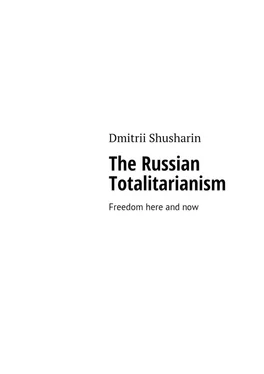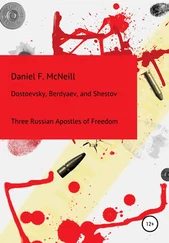The Russian Totalitarianism
Freedom here and now
Dmitrii Shusharin
The real crisis we face today is a spiritual one; at root, it is a test of moral will and faith.
President Reagan’s Speech before the National Association of Evangelicals. Orlando, Florida. March 8, 1983
© Dmitrii Shusharin, 2018
ISBN 978-5-4490-6903-0
Created with Ridero smart publishing system
I am quoting the final words of this book to let people decide right off whether it’s worth their while to read it.
“A freedom fighter is not always a free man. Actually, never. Especially if this is a fight for the freedom of people who don’t want to be free. In our country, in our time, under our circumstances, the road to freedom is very simple. We need to understand and realize that it is useless to guess what is the next act of nastiness a totalitarian power and a totalitarian society are up to. Even less sense makes an attempt to evaluate them by the criteria completely alien to them. The power and the society at all levels treat anyone arbitrarily. Having no legal or moral constraints, they can’t be influenced. It is impossible to have a meaningful agreement with them. Their actions are not difficult to predict, but these projections do not warrant your survival.
The most vacuous and meaningless are indignant denunciations instead of a rational analysis of government and society actions. The power is smart, crafty and resourceful. It manipulates the accusers to make their actions play in its favor. In such a way a self-regulating society is forming. Even more stupid is trying to please the authorities and adapt to social conditions: it will only cause suspicion. It is equally disastrous whether you choose confrontation or collaboration, nonconformism or adaptation.
The realization of all this gives people freedom. No choice to be made between denunciation and conformity. A person can be destroyed at any moment, no matter how he or she behaves; they can be humiliated, deprived of family and property, and there is no way to avoid it. And this is exactly the genuine freedom: a minute before demise, physical or social, and this moment of truth can last for the rest of one’s life.
Actually, this reflection is about no one and nothing in particular. Absolute majority of people doesn’t pay attention to government and society, being harmonically in unison with them. The ones who act otherwise are nonexistent neither for the power, nor for the society. The victims and the resistance heroes are chosen and appointed by the power and society for their own needs and interests.
To be free in such a society is a hard and thankless labor that does not have any public mission. Still, this is the individual freedom of choice, which can’t be denied.
When we came out of the toy railway restaurant on the Wenceslas Square, Anya ran away somewhere, and we were left alone with Eva. We wanted to take a leisurely walk to the Old Town, but first I had to show her monuments to Palach and Zajíc.
On our way home I was telling the story of Prague Spring and the Soviet tanks in Prague. As a 7 year old, she needed clear explanations; first and foremost I had to make her understand the nature of the events and then tell what happened. The point at issue was the reason for the invasion, and inevitably we had to touch upon the specifics of the Russian identity. Eva heard me out very carefully. She said:
“You say bad things about your own people. This is a minus. But you tell the truth. This is a plus. A book about this has to be written.”
Chapter I. Without much effort
The historical and political impotence is not equivalent to the intellectual one. And the last thing to do nowadays is to writhe in hysterics or fall silent in depression. To live through several epochs in three decades is a gift from God, a sign of his benevolence. Those were the fateful moments, but people failed to use them, waiting for an invitation to the feast, instead of laying the table with their own hands. A sudden three hundred sixty degrees turn instead of one hundred and eighty is a great incentive for mental activity, free from all previous concepts and schemes.
There are rules that cannot be argued, but it is really difficult to follow them.
When you are contemplating the social structure, the political culture and the national mindset, it is necessary to consider how all this works in a certain system, and not the personal qualities of those who are in charge of all this. Obviously, this is the right approach. But when the system is built around certain individuals and depends on their personal qualities, you can’t help but place greater focus on them. Bonapartism is a complex socio-historical phenomenon, but you can’t understand a thing in it without taking a close look at the personality of Napoleon Bonaparte.
If you talk about the country’s historical prospects, the strategy for its development, you shouldn’t pay much attention to conflicts between different people in power, their squabbles and passions. Few people in the country know their names. But if there is no public policy and public examination, when strategic decisions are not discussed and taken according to the personal interests of contending individuals and groups, we have to figure out what is behind the exchange of barbs in the press campaigns, rather than try to understand the meaning in confusing statements of politicians.
If the concepts submitted for public debate claim to sum up the experience of the past few years of the country’s development, than, of course, we need to look into them in detail, and debate in a well-argued manner. But if it is clear that behind them there is nothing but claims to absolute power, to comply with the rules of debate is simply dangerous. In humanitarian context, such concepts deny equality of participants in the debate. Because the debate is aimed at the destruction of this context.
In general, the meaning of a statement cannot be reduced to the meanings of the words used in it. It may be the exact opposite of them.
Or maybe not at all connected with them. And if the text is stylistically repulsive, causes laughter or disgust, then this reaction is to be trusted first. Stylistic differences have long been known to be the most profound and meaningful touchstones in public debate. Aesthetic sensitivity and good taste are the most reliable protection against political baseness. And not just political – any. Ethical values are less reliable: a person can be persuaded. But the disgust that stylistic falsity excites is hard to overcome.
There are all sorts of different conventions, the observance of which disarms decent and positive minded people before the brazen depredators. And so, every time we see that the obvious crooks and even potential villains claim to participate on equal terms in the discussion, we should recall how people of their ilk used such occasions to seize absolute power. And how costly it was to get rid of them afterwards.
The main division, which occurred in Russian society, is not the 86% of “Crimea is ours” crowd and 14% sober-minded. The division did not happen at all. It has always been. Now there is another division: one group believe that the time has come for allegories, omissions, haziness and ambiguity, not even Aesop language, but the utter verbal dregs. The other group believes it’s time for clarity. Few people think it is important and necessary to study the transformation of the political system, the imminent collapse of which has been predicted by the intellectuals since last year of the last century. Here is a selection of some statement of the most notable freethinkers 1 1 http://www.politonline.ru/interpretation/22880154.html
:
Читать дальше












